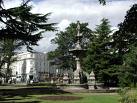 Charles Phillips Collins M.D. M.R.C.S. L.R.C.P. (28 February 1833 – c. 1913) was an orthodox physician who converted to homeopathy to become Ordinary Physician and Committee Member at the Leamington Dispensary for the Homoeopathic Treatment of Chronic Diseases, where he worked alongside Consulting Physician John Stuart Sutherland. Charles P. Collins became a member of the British Homeopathic Society in 1862. He was also a member and Vice-President of the Midland Homoeopathic Medical Society from 1866, a member of the Hahnemann Publishing Society, and a subscriber to the Homeopathic Medical Benevolent Fund.
Charles Phillips Collins M.D. M.R.C.S. L.R.C.P. (28 February 1833 – c. 1913) was an orthodox physician who converted to homeopathy to become Ordinary Physician and Committee Member at the Leamington Dispensary for the Homoeopathic Treatment of Chronic Diseases, where he worked alongside Consulting Physician John Stuart Sutherland. Charles P. Collins became a member of the British Homeopathic Society in 1862. He was also a member and Vice-President of the Midland Homoeopathic Medical Society from 1866, a member of the Hahnemann Publishing Society, and a subscriber to the Homeopathic Medical Benevolent Fund.
He practiced at 10 Euston Place, Leamington, 24 Willes Road, and Norham Lodge, Leamington, Warwickshire.
Charles Phillips Collins was born on 28 February 1833 in Bayswater, Middlesex, the son of gentleman William Collins (1795 – 1866) and Amelia Anne Dean (1792 – 1879).
Collins studied at Middlesex Hospital School of Medicine. In June, 1858, he was awarded a prize in surgery at the school by William Ewart Gladstone M.P.
By 1860, Charles Collins was practicing at 23, Stone Street, Maidstone, Kent. That year he was elected a Member of the Royal College of Surgeons. He was still at this address in 1864.
It is unclear whether Collins was yet a practitioner of homeopathy at this time, but in 1860 he was an advocate of the “movement cure” devised by Swedish physician and massage pioneer Pehr Henrik Ling. That year Collins issued a small book on the subject, A Few Words on the Curative Power of Systematized Exercises: Or, the Movement Cure.
By 1872, Collins was recorded as having practiced homeopathically for between ten to fifteen years, meaning he had been a practicing homeopath since at least 1862.
In 1865, Collins became a Licentiate of the Royal College of Physicians. That year he relocated to Leamington, Warwickshire.
In August, 1868, Collins married Emma Elizabeth Harrison in the Parish Church of Llandinorwig, Wales. They had three daughters: Evelyn Mary (1870 – 1961), Maud Gertrude Elizabeth (1871 – 1963), Alice Grace (b. 1873).
In 1869, C. P. Collins was awarded his M.D. from Cleveland Homeopathic Medical College.
In addition to his medical career, Collins was also a Freemason. In December 1875, he was admitted into the Shakespeare Lodge in Warwick, one of the oldest lodges in Britain.
Collins frequently contributed letters and articles to homeopathic publications, and was active in the wider homeopathic community, regularly attending British Homeopathic Congress gatherings. These included the first of the revived meetings, held in Birmingham in 1870 and the Manchester Congress in 1875, where he was joined at both by Leamington hydropath George Maberley, and the British Homeopathic Congress held at the Midland Medical Institute in Birmingham in September 1888. At the 1871 Congress held in Oxford, Collins was elected to serve as one of the Secretaries, along with James Gibbs Blake, and he was a member of the Executive Committee for the 1873 meeting held in Leamington, alongside Doctors Francis Black, Gibbs Blake, John James Drysdale, Evan Fraser, William Sharp, and Edward Wynne Thomas.
In March 1887, Collins sold his practice and relocated to Great Malvern, where he had purchased the practice of fellow homeopath and hydropath, William Thomas Fernie. Collins’ residence in Malvern was Ardencaple, Tibberton Road, but he also rented the Hay Well Baths with a view to combining hydropathy and homeopathy.
Collins’ stay in Malvern was brief, and he returned to Leamington in early 1888 after repurchasing his former practice from Dr. Cary (possibly Tristram Cary). He established himself at 2 Euston Place, and from the end of March more permanently at Newark House, Newbold Terrace. That year, 1888, Collins was also a contributor to the legal defence fund established by the Monthly Homeopathic Review for Lancet co-editor and homeopathic sympathizer, Kenneth William Millican.
During the 1890s, Collins’ dedication to homeopathy also extended to contributing financially as a subscriber to the London Homeopathic Hospital.
By 1913, Collins was recorded as a member of the Cremation Society of England, founded in 1874.
Select Publications:


Leave A Comment